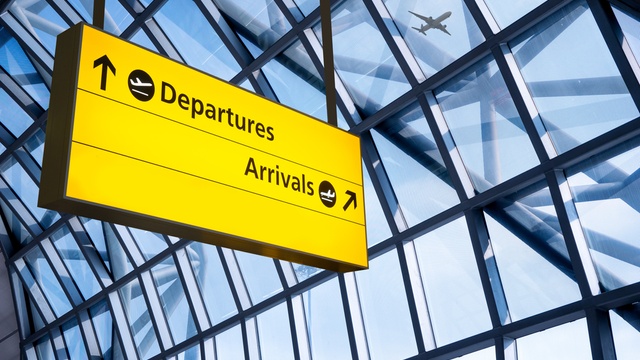Where there’s an opportunity for a scam, there’s a fraudster who’ll take it. And, this summer’s travel chaos is no exception.
With the start of the year already plagued by flight disruption and luggage delays, thousands of holidaymakers will be eligible for refunds or compensation for the issues they’ve faced.
However, if you’re making a claim, stay on your guard. Fraudsters are already capitalising on the crisis, using flight refund scams to take advantage of those due some money back.
What is a flight refund scam?
A flight refund scam could take a couple of different forms. They could be:
- phishing scams, where fraudsters pose as a travel company offering you a refund as a way of stealing your personal information (and potentially your money, too)
- claims management scams, where fraudsters charge you a fee to handle your refund or compensation claim for you, and then steal your refund money
How to spot a flight refund phishing scam
In a phishing scam, fraudsters pretend to be an organisation you know and trust in order to get hold of your personal details and financial information. In the case of flight refund scams, the fraudster may pretend to be:
- the travel agent you booked with
- an airline
- a travel insurance company
- the Civil Aviation Authority (CAA)
In most phishing scams, the fraudster will contact you by email. But, they may also get in touch by phone call (known as vishing) or by text message (smishing). Their goal will be to get you to hand over personal information like your name, date of birth and address, as well as financial information like your bank and credit or debit card details. In an email or text message, they’ll likely ask you to click a link within the message, which will take you to a fake website to provide your details. On the phone, the fraudster will simply ask for the information.
Visiting a fake website sometimes also results in tracking software or malware being installed on your computer, which means the fraudster may be able to access more information about you than you provide to them.
But, how can you spot this type of scam if it lands in your inbox, or you get a call? These are some of the signs to look out for:
- How you’re greeted – Generic greetings like “Dear Sir/Madam” or “Dear customer” are common in this type of scam. Meanwhile, legitimate contact from an organisation will usually address you by name.
- Spelling mistakes – We’re all guilty of the odd typo now and then, but scam messages are known for being riddled with spelling mistakes and grammar issues that mean they don’t make proper sense.
- Dodgy links and email addresses – These can range from email addresses that are a jumble of random numbers or letters, to scarily convincing fakes. Keep a particular eye out for emails coming from web-based services like Gmail and Yahoo, as well as extra punctuation like dashes and full stops that wouldn’t be in a legitimate email address or link.
- Urgency and aggression – A common tactic that fraudsters use is to make their message seem urgent, encouraging you to act immediately. This might mean imposing a deadline on you to get your refund claim in. Or, on the phone, the scammer may get irritated or aggressive if you don’t give them the information they want straight away.
It’s also a good idea to check if you actually have a relationship with the company that’s contacting you about a flight refund. Fraudsters will often contact you without knowing for certain if you’re a customer of the company they’re posing as. If you’re not sure either, then you may be more likely to fall victim to a scam.
How to spot a flight refund claims scam
If you’re owed a refund or compensation after flight disruption, then you can request this yourself for free, through the airline you were due to fly with. It can be a tricky and drawn-out process, though, which is why companies offering to handle your claim for you may seem like a great idea. However, while there are some legitimate claims companies out there, others are scammers.
In a flight refund claims scam, fraudsters will offer to manage your refund or compensation claim for you, in exchange for a fee, and then make off with the money you’re due to receive. They may give you an excuse to explain why you won’t receive your money, but it’s also possible that they’ll simply vanish without a trace.
However, legitimate claims companies also manage your claim for a fee. So, how can you tell whether you’ve enlisted genuine help, or fallen for a scam? One tell-tale sign of a claims scam is promises that sound too good to be true. Perhaps the company is guaranteeing you’ll get your refund in a very short timeframe. Or, maybe they’re promising to get you a refund or compensation, even if your claim has been rejected by the airline before.
Despite signs like this, it can still be very difficult, if not impossible, to tell whether you’ve signed up with a legitimate claims company or a scammer until it’s too late.
For this reason, it may be best to steer clear of any company offering to organise a flight refund or compensation for you. In doing so, you’ll be protecting yourself against any nasty scams that are out there, and saving money on something you can sort out for yourself, for free.
How to report a flight refund scam
If you receive a suspicious message about a flight refund, think you’ve seen a dodgy claims company online, or even if you think you’ve given your information to a scammer, report it straight away. You should report it to:
- the company you think the fraudster is posing as
- your bank – especially if you’ve shared or been asked for payment details
- Action Fraud, either online or by calling 0300 123 2040
Helen is a personal finance editor who’s spent 11 years (and counting!) in the finance industry. She creates content on everything money with the goal of getting people thinking – and talking – about their finances in ways they may not have done before.
![Email icon]()
Become a money maestro!
Sign up for tips on how to improve your credit score, offers and deals to help you save money, exclusive competitions and exciting products!
Find this useful? Share it with others!









